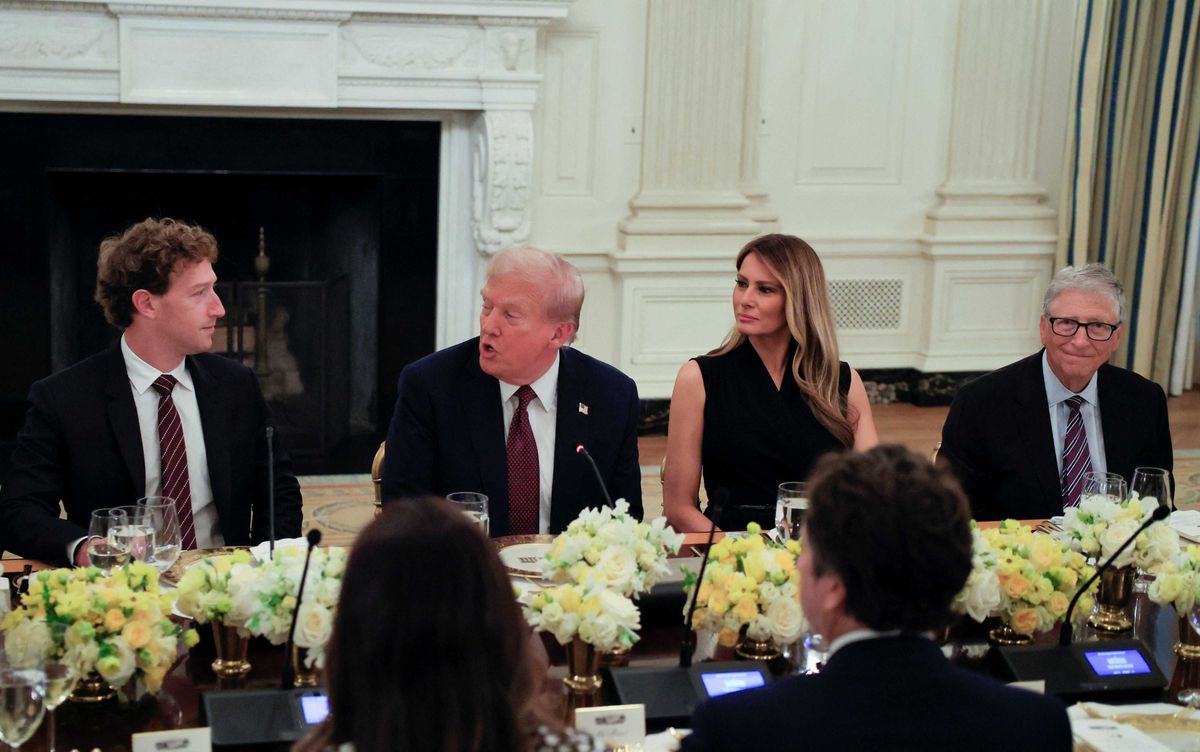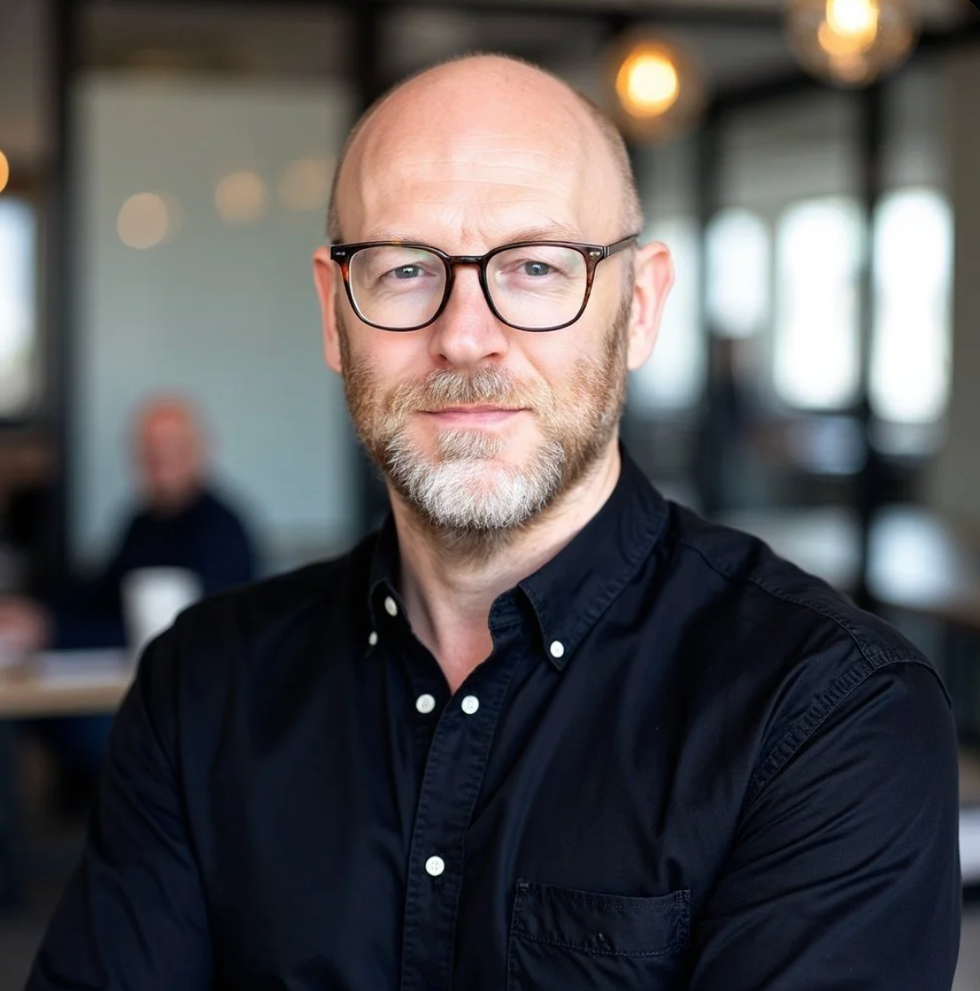
Flanked by Meta CEO Mark Zuckerberg and Microsoft co-founder Bill Gates, President Donald Trump and First Lady Melania Trump hosted a White House dinner with some of the richest and most powerful leaders of the world’s tech giants.
To Fraser Patterson, CEO and founder of Skillit, an AI-powered construction hiring platform, it was no coincidence that after the meeting last month of more than 30 Silicon Valley power players and Trump advisers, the administration unveiled a plan to charge $100,000 one-time application fees for H-1B visas, which tech companies typically use to employ highly skilled foreign workers.
“It can appear as though, rather than it being an improvement to immigration policy, it feels a little more like a labor war strategy,” Patterson said.
“Isn't one of the great tenets of the American way of life and Constitution the separation of church and state? Wouldn't that extend to business, too, between business and state?”
Patterson’s New York-based company employs eight — an infinitesimal fraction of the workforce at giants like Amazon, with more than a million employees and nearly 15,000 H-1B visa holders.
“The largest technology companies are going to be able to hoard the best global talent, and I think it's easy to be able to draw a straight line between that and shutting out the smaller startups and the smaller firms that can’t enforce that price tag,” Patterson said.
“I think it scales back the competitiveness of the technology industry, broadly speaking.”
‘Global war on talent’
The Trump administration says the current H-1B visa program allows employers “to hire foreign workers at a significant discount to American workers,” and the program has been “abused.”
Last week Sens. Chuck Grassley (R-IA) and Dick Durbin (D-IL) reintroduced bipartisan legislation, The H-1B and L-1 Visa Reform Act, to close loopholes in programs they say tech giants have used while laying off Americans.
But, Patterson said, limiting H-1B visas will effectively end up “closing the door on skilled workers” and “gift Europe the best possible opportunity to label itself as the tech talent hub.
“The general consensus is this is going to narrow the pool,” Patterson said.
“There's going to be just fewer nationalities represented, fewer ideas. The U.S. becomes less of a magnet.”
Rich Pleeth, CEO and founder of Finmile, an AI-powered logistics and delivery software, agreed that the fee might tilt the scales of tech dominance away from the U.S., where places like San Francisco and New York have long been considered global hubs for innovation.
“The global war on talent is real,” Pleeth said. “Europe has a golden opportunity … Canada, Singapore, Berlin, they're all going to benefit.”
 Rich Pleeth (provided photo)
Rich Pleeth (provided photo)
Finmile employs 15 people in the U.K., seven in Romania and two in the U.S.
“It's very challenging for smaller companies like us,” Pleeth said.
“Talent is everything, and if the U.S. makes it harder to bring in the world's best talent, where do you set up headquarters?”
While the Trump administration says the new H1-B fee will help American workers, particularly recent college graduates seeking IT jobs, Patterson said it would have the opposite effect, likely leading to “greater offshoring.”
Thanks to Trump’s array of trade tariffs, which he says will bring jobs back to the U.S., many American small businesses are already struggling to survive as they face increased costs.
“In reality, it's probably going to lead to labor shortages,” Patterson said. “You can't just turn on a faucet overnight to really highly skilled local workers.”
Nicole Whitaker, an immigration attorney in Towson, Md., said the proposed $100,000 fee sends the message to foreign workers seeking job opportunities in the U.S. that "our doors are closed ... find another country."
"This is a part of a bigger and broader push by this administration — even if things don't go into effect— to make it look like we are shutting down our borders. We are not open, and we're not welcoming toward immigrants," Whitaker said.
‘The next Googles’
Pleeth, a former marketing manager at Google, pointed to tech leaders including Microsoft CEO Satya Nadella and Google CEO Sundar Pichai, who were born in India but came to the U.S. for college and to work.
“If you suddenly make it hard for talented people to come in, the next Googles are not going to be built in the U.S.,” Pleeth said.
“Talent is the oxygen for the tech industry. For decades the U.S. had an open pipeline … we don't expect the $100K toll to hit the tech companies who are the ones who can afford it the most.”
Skillit currently does not have any employees sponsored through the H-1B visa program but Patterson said he had used it when the fees were more reasonable, around $2,500.
Patterson, who was born in Scotland, came to the U.S. on an O-1 visa for foreign workers of “extraordinary talent.” He is now close to becoming a U.S. citizen.
 Fraser Patterson (provided photo)
Fraser Patterson (provided photo)
“Very onerous, nerve-racking, even to get here … but I would say it wasn't disproportional to the value of coming here,” he said.
Pleeth wants to move from the U.K. to the U.S. with his wife, two daughters and dog, a process he expects some challenges with but is hopeful will “eventually move forward.”
“It's just going to become a lot harder for junior people who can share cultures, can come in with new ideas,” Pleeth said.
“It's a talent tax.”




